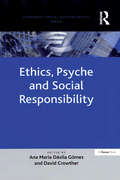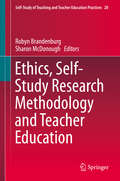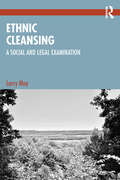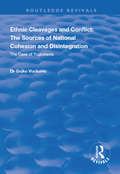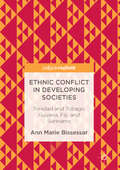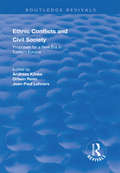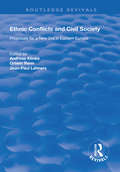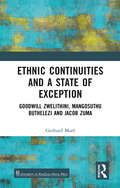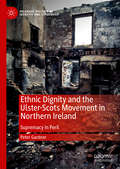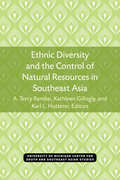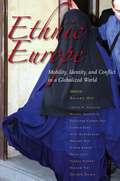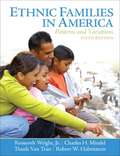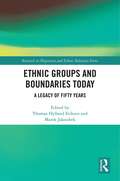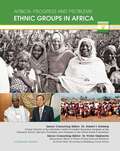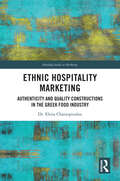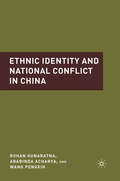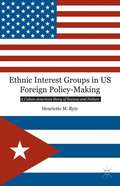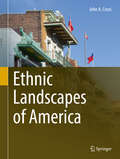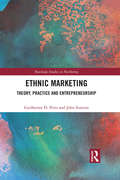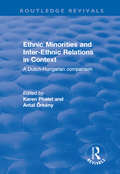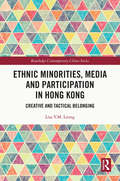- Table View
- List View
Ethics, Psyche and Social Responsibility (Corporate Social Responsibility Series)
by Ana Maria GomezThe last few decades have seen significant changes in the structure of business organizations, including downsizing, outsourcing and flattened management structures. The effects on employees have been considerable. In this context the importance of the psychological contract between employer and employee has been overlooked, and there is uncertainty about what can be done to bring about changes to this contract and ultimately the future of organizations. This important book considers the psychological aspects of organizational life, particularly in the context of firms' ethical behaviour and its implications for corporate social responsibility. The authors consider the effects of corporate activity and change on individuals, not just in their working lives, but also in their family and social lives. They address a diverse number of topics from a variety of theoretical standpoints in an ongoing attempt to redress this neglected field of research.
Ethics, Self-Study Research Methodology and Teacher Education (Self-Study of Teaching and Teacher Education Practices #20)
by Robyn Brandenburg Sharon McDonoughThis book examines the nuanced and situated experiences of self-study researchers. It explores the ways in which ethics are dynamic, idiosyncratic and require an ongoing ethical reflexivity. In addition, the book identifies, documents and collates the collective experiences of self-study researchers and sheds new light on the role and impact of ethics, ethical dilemmas and ensuing decisions for education researchers.The book considers the ethical dilemmas that self-study researchers in teacher education face, their careful ethical considerations while conducting research, and how they form their professional judgment and understanding of what it means to be an ethical self-study researcher. For self-study researchers, there are a number of ethical dilemmas and challenges that cannot be neatly captured by the frameworks and guidelines of an ethics board. For many, this requires researchers to be ever-present and re-engaged with the ethics of their own projects, from the development, through to the dissemination of their work.Readers will gain a deeper understanding of ethics, ethical perspectives and practices in the field of self-study research.
Ethik und Kapitalismus – Zum Problem des kapitalistischen Geistes: Herausgegeben und eingeleitet von Klaus Lichtblau (Klassiker der Sozialwissenschaften)
by Max SchelerUnter den sich mit der historischen Genese und der epochalen Eigenart des modernen Kapitalismus befassenden Studien kommt den kapitalismuskritischen Schriften von Max Scheler (1874-1928) ein besonderer Stellenwert zu. Scheler, der in den zwanziger Jahren des vergangenen Jahrhunderts zusammen mit Karl Mannheim die moderne Wissenssoziologie begründete, hatte sich in die um 1900 zwischen Lujio Brentano, Werner Sombart, Max Weber und Ernst Troeltsch geführte Debatte über die religiösen Wurzeln des „kapitalistischen Geistes“ in einer sehr produktiven, heute weitgehend vergessenen Weise eingemischt und dabei eine höchst eigenwillige, durch die katholische Soziallehre geprägte Position vertreten. Bezüglich der Entstehung der modernen Wirtschaftsethik war er ähnlich wie Max Weber vor allem am Ethos jenes Menschentypus interessiert, der als Bürger und Unternehmer dem modernen industriellen Kapitalismus zum Durchbruch verhalf.
Ethisches Theater: Grundlagen des ethischen Managements und der strukturellen Transformation des Theaters
by Thomas SchmidtMit dem Konzept des Ethischen Theaters wird ein ganzheitliches Zukunftsmodell vorgestellt. Ausgangspunkt ist die Analyse der gegenwärtigen Krisen und der Komplexität in den deutschsprachigen Theatern, um die Grundlagen für ihren Transformationsprozess zu entwickeln. Mit dem Ethischen Theater wird ein Ziel dieses Prozesses vorgestellt: das ganzheitliches Zukunftsmodell einer Theater-Organisation des 21. Jahrhunderts, in der ethische Überlegungen erstmals in allen Prozessen handlungsleitend sind. Das Modell ist kompatibel mit den Interessen der Stakeholder und den wichtigen Reformprozessen, es ermöglicht die anstehende strukturelle Modernisierung der Theaterbetriebe. Unterstützt wird es durch das Konzept des Ethischen Theatermanagements, das erstmals über die klassischen Funktionen hinaus auch Aspekte der Diversität, der Nachhaltigkeit, der Ethik und der Zukunftsfähigkeit adressiert. Mit den erweiterten Funktionen des ethischen Managements werden auch weitere Möglichkeitsräume für die Zukunft der Kultur-Organisationen eröffnet.
Ethnic Cleansing: A Social and Legal Examination
by Larry MayPutting forward the argument that the strength of democracies can be measured in how well minorities – especially ethnic and racial minorities – are treated by the majority, Larry May’s Ethnic Cleansing maintains that unjust ethnic cleansing is one of the greatest internal challenges to the modern institutions of pluralistic and multicultural states.In order to determine what constitutes the crime of ethnic cleansing, this book details crucial conceptual issues around the topic, such as what ethnicity means, what ethnic cleansing claims to achieve, why these acts are invariably harmful, and the conditions of restitution, reparation, and reconciliation – affirming that ethnic cleansing must be countered by existing institutions such as the International Criminal Court, which is uniquely situated to prosecute ethnic cleansing.The first major study to analyze ethnic cleansing from an explicitly normative and conceptual perspective in the last decade, the increase in number and complexity of cases of ethnic cleansing makes this a timely book to understand the challenges that confront contemporary society.
Ethnic Cleavages and Conflict: The Sources of National Cohesion and Disintegration - The Case of Yugoslavia (Routledge Revivals)
by Gojko VuckovicFirst published in 1997, this volume explores ethnic conflict alongside the creation and disintegration of the short-lived Yugoslav state, 17 years after the death of Tito. Processes of democratization tend to elicit differences within the population along deep-seated ethnic, religious and cultural differences. Dr. Gojko Vuekovic argues that the situation is no different in post-Cold War Yugoslavia. By setting out Yugoslavia’s worst-case scenario of ethnic tensions, Dr. Vuekovic hopes to inform responses to ethnic conflict in the wider modern world.
Ethnic Conflict in Developing Societies
by Ann Marie BissessarThis book examines the experience of post-colonial territories and their attempts to manage ethnic communities within their countries. The study focuses on Trinidad and Tobago, Guyana, Suriname, and Fiji. This project looks at the mechanisms, which vary from legislation to political structures, systems, and institutions that have been introduced to allow for greater integration by these communities, and assesses their strengths and weaknesses.
Ethnic Conflicts and Civil Society: Proposals for a New Era in Eastern Europe (Routledge Revivals Ser.)
by Ortwin Renn Andreas Klinke Jean-Paul LehnersThis title was first published in 2000: The papers presented in this volume are based on the discussions of a workshop which asked: how can ethnic and political cooperation be accomplished in ethnically and politically heterogeneous countries after the collapse of the communist regimes which left a void for nationalist and even chauvinist movements? The objectives are: to promote a better understanding of the contemporary "ethnic" conflicts and their social, cultural and political causes; to determine the historical, structural and political developments that have led to or intensified these conflicts; to analyze and develop positive role models for coping with such conflicts; to provide constructive proposals for future conflict resolution mechanisms; and to identify the crucial elements for building trust-generating institutions on the basis of the civil society model. The papers address ethnic conflicts in Eastern Europe, with a particular focus on the former republics of Yugoslavia. They aim to go beyond the analysis of causes and manifestations of such conflicts and to offer constructive ideas for the post-Civil-War period.
Ethnic Conflicts and Civil Society: Proposals for a New Era in Eastern Europe (Routledge Revivals)
by Ortwin Renn Andreas Klinke Jean-Paul LehnersPublished in 1997. After the collapse of the communist system, the political systems in Eastern Europe were unable to cope with increasing tensions between ethnic majorities and minorities. These tensions led to violent ethnic conflicts and civil wars, in particular in former Yugoslavia. In this phase of transition and nation-(re)building, ethnic groups strove for more political autonomy and even territorial secession. The newly independent states lacked democratic structures and traditions as well as civil manners that could be used for regulating ethnic conflicts. The idea of Civil Society provides both basic democratic mechanisms for a lasting co-existence in an ethnically plural society. The theoretical part of this book discusses the issues of conflict anatomy, causes for conflict, and democratic conflict resolution. The empirical part describes experiences of ethnic conflicts in former Yugoslavia (especially Slovenia, Croatia and Serbia) in Ukraine and Romania. Experiences from Switzerland and the United States demonstrate successful examples of ethnic conflict management and illustrations of the political culture within a Civil Society.
Ethnic Continuities and a State of Exception: Goodwill Zwelithini, Mangosuthu Buthelezi and Jacob Zuma
by Gerhard MaréThis book alerts readers to the dangers of tradition as a formal, structured politics, which enriches a narrowly elite minority while overriding democratic rights, effecting a ‘state of exception’ for the governance of millions who are rendered as ‘subjects’ in South Africa. Gerhard Maré sets his focus on three powerful men – Goodwill Zwelithini, Mangosuthu Buthelezi and Jacob Zuma – to illustrate how, from different social locations, each has relied on claims to Zulu tradition to occupy powerful and financially rewarding positions.Print edition not for sale in Sub-Saharan Africa.
Ethnic Dignity and the Ulster-Scots Movement in Northern Ireland: Supremacy in Peril (Palgrave Politics of Identity and Citizenship Series)
by Peter GardnerIn this book, Peter Gardner contends that the production of narratives of ethnic peoplehood is an attempt to regain a sense of collective dignity among the previously dominant. After introducing the concept of ethnic dignity and locating its place within postconflict identity politics, Gardner focuses his analysis on the Ulster- Scots story of peoplehood. Drawing on a wealth of primary data, the chapters explore a variety of core issues including ethnopolitics, social class, political-economic ideology, colonialism, and heteromasculinity. The book concludes by taking a global view of post-conflict ethnic dignity among the once dominant, analysing the New Afrikaans movement in South Africa, white pride and ethnic whiteness studies, and Maronite Phoenicianism in Lebanon. This will be an important contribution for students and scholars of ethnicity, divided societies and, more broadly, political sociology.
Ethnic Diversity and Economic Instability in Africa
by Hiroyuki Hino John Lonsdale Gustav Ranis Frances StewartThere is growing consensus in the development economics literature that ethnic diversity is a very significant factor in explaining Africa's poor economic performance. Ethnic Diversity and Economic Instability in Africa challenges this conventional wisdom. Drawing on the insights of historians, anthropologists and political scientists as well as development economists, this book questions whether ethnicity is the most useful organising principle by which to examine the economic development of Africa, arguing that it is a more fluid and contingent concept than economic models allow. Instead, the authors explore the actual experience of ethnicity in Africa and propose new methods of measuring ethnic diversity and inequalities. Finally some tentative conclusions are reached regarding appropriate policy reforms.
Ethnic Diversity and the Control of Natural Resources in Southeast Asia (Michigan Papers On South And Southeast Asia #32)
by Karl L. Hutterer A. Terry Rambo Kathleen GilloglyThe authors consider the ways in which the high degree of ethnic diversity within the region is related to the nature of tropical Asian environments, on the one hand, and the nature of Southeast Asian political systems and the ways in which they manipulate natural resources, on the other. Rather than focus on defining the phenomenon of ethnicity, this book examines the different social evolutionary contexts in which the phenomenon is manifested. Companion volume to Cultural Values and Human Ecology in Southeast Asia (Michigan Papers no. 27).
Ethnic Europe: Mobility, Identity, and Conflict in a Globalized World
by Roland HsuOver the past several decades, Europe has become a destination for immigrants from all over the world. This volume examines the issues of ethnicity and immigration that face the European Union today, examining the struggle of EU nations to balance minority rights with social cohesion. Contributors look at issues including labor migration, strains on social welfare systems, separatist movements, the durability of local traditions, and the role of Islamic diasporas. Annotation ©2010 Book News, Inc. , Portland, OR (booknews. com)
Ethnic Families in America: Patterns and Variations
by Robert W. Habenstein Roosevelt Wright Charles H. Mindel Thanh Van TranReflecting the social and political dynamics in the United States, this edited volume offers an inclusive look at multicultural diversity in the U.S. with extensive coverage of the family life styles, traditions and values of seventeen American ethnic groups. <P><P>Providing unique and personal insights, each chapter is written by a contributing author representing a particular ethnic group and is structured in a similar pattern - covering the historical background, key ethnic cultural components, traditional and current ethnic family characteristics, and changes and adaptations to the ethnic family and culture. The book is suitable for undergraduate courses in Sociology of the Family, Sociology of Minority Groups, Social Work with Minority Groups, and Race and Ethnicity.
Ethnic Groups And Boundaries: The Social Organization Of Culture Difference
by Fredrik BarthThis classic is regarded as the seminal text from which stems much current anthropological thinking about ethnicity. This text opens with Barth's invaluable thirty-page essay that introduces readers to important theoretical issues in the analysis of ethnic groups.
Ethnic Groups and Boundaries Today: A Legacy of Fifty Years (Research in Migration and Ethnic Relations Series)
by Thomas Hylland Eriksen Marek JakoubekThe publication of Fredrik Barth’s Ethnic Groups and Boundaries marked a milestone in the conceptualization of ethnicity and ethnic groups and opened a new field of enquiry in the social scientific study of ethnicity. Ethnic Groups and Boundaries Today: A Legacy of Fifty Years demonstrates the enduring significance of the work, identifying its shortcomings and showcasing the state of the art today, fifty years after the publication of the groundbreaking original. Bringing together a team of leading contributors, all of whom have been inspired by Barth's theory and have made significant contributions of their own to the theorisation and research of ethnicity, this volume assesses the theoretical approach presented in Ethnic Groups and Boundaries, both in the context of its time and with the hindsight of the developments in the social sciences since then. It emphasizes the legacy of the original text and determines its significance, whilst identifying and elaborating on the main lines of the subsequent developments of the concept of ethnicity that were influenced by Ethnic Groups and Boundaries, but that have since developed and superseded the original. As such, it will appeal to scholars across the social sciences with interests in the concept and study of ethnicity.
Ethnic Groups in Africa (Africa: Progress and Problems #13)
by Elizabeth ObadinaEthnic or racial classifications often say more about culture and shared experience than about genetics or common ancestry. In Africa, a continent where up to 3,000 languages are spoken, ethnicity can be especially difficult to define. Unfortunately, perceived ethnic differences have all too often produced tragic results. This book analyzes the role of ethnicity in contemporary African politics and governance. It examines the corrosive legacy of the slave trade and European colonization, details some of the bloody conflicts that have erupted from ethnic frictions, and describes how divisions that appear to be ethnically based often have more to do with class and religion. The book also explores the possibility of a united Africa, able to harness its diversity rather than fight over its differences.
Ethnic Hospitality Marketing: Authenticity and Quality Constructions in the Greek Food Industry (Routledge Studies in Marketing)
by Elena ChatzopoulouEthnic-themed restaurants are informal but powerful ambassadors for a country’s culture and contributors to local and national economies. Communicating authenticity and quality are essential characteristics in the development of a competitive and effective marketing strategy for restaurants. This book analyses how authenticity and quality perceptions are both constructed and communicated within the ethnic dining sector. Drawing on qualitative research methods, the book explores examples from the Greek food industry to analyse restaurateurs’ and consumers’ constructed meanings of authenticity, and how it is transmitted and received. It follows by exploring the marketing implications of consumer constructs and effective promotional methods to aid restaurateurs to better engage with customers whilst also respecting their culinary culture. It also guides the reader through the use of NVivo for research purposes, and its utilisations to facilitate inductive and interpretive analyses. This book offers a valuable resource for researchers across marketing, including consumer behaviour, food marketing, marketing research and communications. The data analysis tools explored are also transferable to a wide range of sectors outside of food and dining.
Ethnic Identity and National Conflict in China
by Rohan Gunaratna Arabinda Acharya Wang PengxinWhile, not discounting the potency of the radical Islamic religious discourse in fuelling the contemporary wave of terrorism, this book makes an attempt to explain terrorism in China as an ethno-nationalist conflict rooted in issues involving minority identity. However, a largely domestic conflict is being hijacked by the radical Islamists.
Ethnic Interest Groups In Us Foreign Policy–making
by Henriette M. RytzThis book comprises the first systematic study on the impact of ethnic interest groups on US foreign policy, using the case study of how the Cuban?American National Foundation (CANF) influenced the outcome of three different legislatives debates that directly affected US Cuba policy.
Ethnic Landscapes of America
by John A. CrossThis volume provides a comprehensive catalog of how various ethnic groups in the United States of America have differently shaped their cultural landscape. Author John Cross links an overview of the spatial distributions of many of the ethnic populations of the United States with highly detailed discussions of specific local cultural landscapes associated with various ethnic groups. This book provides coverage of several ethnic groups that were omitted from previous literature, including Italian-Americans, Chinese-Americans, Japanese-Americans, and Arab-Americans, plus several smaller European ethnic populations. The book is organized to provide an overview of each of the substantive ethnic landscapes in the United States. Between its introduction and conclusion, which looks towards the future, the chapters on the various ethnic landscapes are arranged roughly in chronological order, such that the timing of the earliest significant surviving landscape contribution determines the order the groups will be viewed. Within each chapter the contemporary and historical spatial distribution of the ethnic groups are described, the historical geography of the group’s settlement is reviewed, and the salient aspects of material culture that characterize or distinguish the group’s ethnic landscape are discussed. Ethnics Landscapes of America is designed for use in the classroom as a textbook or as a reader in a North American regional course or a cultural geography course. This volume also can function as a detailed summary reference that should be of interest to geographers, historians, ethnic scholars, other social scientists, and the educated public who wish to understand the visible elements of material culture that various ethnic populations have created on the landscape.
Ethnic Marketing: Theory, Practice and Entrepreneurship (Routledge Studies in Marketing)
by John Stanton Guilherme D. PiresTogether with the development of transformative technologies that epitomize globalization, the ongoing movements of people across borders and other socio-economic pressures are creating a fast-changing business environment that is difficult for business to understand, let alone control. Dominant social expectations that immigrants should seek to adopt an assimilationist socialization path towards the host country’s mainstream are contradicted by minority ethnic group resilience. There is no evidence that these groups naturally disappear within the cultural and behavioural contexts of their adopted countries. Since ethnic minority consumers cannot be expected to assimilate, then they maintain some significant degree of unique ethnicity related consumer characteristics that convert into threats and opportunities for business. The inherent socialisation process also provides opportunities for ethnic entrepreneurship and for proliferation of ethnic minority business. Following from the extensive examination of scholarly perspectives of ethnic marketing theory, there is an acknowledged and marked divide between theoretical exhortations and what is done in practice, a relative oversight of the implications of mixed embedded markets, and a propinquity to overlook the crucial role played by ethnic entrepreneurship and ethnic networks. Opportunity valuations are difficult to enact due to a lack of intelligence about ethnic markets. Variable sentiment about the future of ethnic marketing links to different predictions on how the drivers of globalization will impact on the acculturation paths of ethnic minorities. Keeping a focus on the ethnic group as the unit of analysis, combining ethnic marketing and ethnic entrepreneurship theories provides intelligence about contemporary ethnic marketing and practice perspectives. The ultimate objective is to reduce the theory-practice divide through the development of a collaborative framework between business and scholars that converts into theory-in-use.
Ethnic Minorities and Inter-ethnic Relations in Context: A Dutch-Hungarian Comparison (Routledge Revivals)
by KAREN PHALET AND ANTAL ÖRKÉNYThis volume is based on papers presented on ethnic minorities and inter-ethnic relations in Hungary and The Netherlands, which were presented and discussed in three conferences and a series of meetings from 1997-1999. This work builds on comparative studies of the rise of a radical right and the mobilization of anti-immigrant feelings. It presents cross-national comparative research, due to the creedence that shifting national angles is a powerful strategic tool with which to correct national bias and to uncover submerged or overlooked aspects of specific national cases. The book brings together contributions from Hungarian and Dutch scholars in the field of ethnic minorities and inter-ethnic relations. The two countries are used as exemplary cases of distinct ethno-political patterns in Central and Western Europe. Combining complementary configurational and dimensional approaches to cross-national comparison, the diverse forms of ethnic relations in Hungary and The Netherlands are analyzed, and competing explanations of ethno-political conflict (or co-ordination) are tested in both national contexts.
Ethnic Minorities, Media and Participation in Hong Kong: Creative and Tactical Belonging (Routledge Contemporary China Series)
by Lisa Y.M. LeungSecond and third generation South and Southeast Asian minorities in Hong Kong, being marginalized from mainstream social and political affairs, have developed an ambivalent sense of belonging to their host society. Unlike their forefathers who first settled in Hong Kong under British colonial rule, these younger generations have spent their formative years in the territory. As such, they have increasingly engaged in the public and political realms of society, partly in response to the territory’s rapid political changes. Leung discusses and analyses the complex and diverse engagement of migrant and minority youths in Hong Kong - and their struggle for recognition, while desiring to 'be-long' to a place they call home. Some are joining the calls for democratic changes in the territory. In particular, she argues that much of this struggle can be seen in minorities’ involvement in creative sectors of society. While it will be of especial interest to scholars with an interest in Hong Kong, this book presents a compelling case study for anyone interested in the dynamics of migrant and minority engagement in the creative sector as a strategy for engagement.
